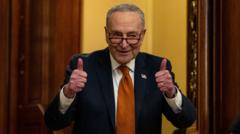In a critical vote just hours ahead of a deadline, the Republican-controlled House of Representatives passed a budget deal to avert a government shutdown for the first time since 2019. However, the bill faces uncertainty in the Senate and has sparked significant debate regarding the influences of political figures like Donald Trump and Elon Musk.
US House Passes Budget Deal, Avoiding Government Shutdown for Now

US House Passes Budget Deal, Avoiding Government Shutdown for Now
The House of Representatives has successfully passed a bill to prevent a government shutdown, pushing the resolution towards the Senate while highlighting political tensions and external influences.
The Republican-controlled House of Representatives has voted to advance a budget deal aimed at preventing a government shutdown, marking the first such measure since early 2019. The legislation passed overwhelmingly with a vote tally of 366 to 34, just six hours before the impending midnight deadline. Despite this victory, the bill must gain approval from the Democratic-controlled Senate and ultimately be signed into law by President Joe Biden.
Earlier negotiations to secure a funding agreement encountered disruptions after outspoken figures like President-elect Donald Trump and tech entrepreneur Elon Musk urged Republicans to dismiss earlier proposals. As tensions rose, the House undertook three separate attempts to finalize a deal this week, following the failure of a funding measure supported by Trump just days prior.
The budget proposal, named the "American Relief Act, 2025," spans 118 pages and notably excludes a contentious debt-limit provision initially pushed by Trump, who aims to shape future spending under his potential administration. Additionally, the latest iteration of the bill has removed funding for various Democratic initiatives, including the first pay raise for lawmakers since 2009 and federal allocations for public infrastructure repairs.
Democrats unanimously backed the funding bill in attendance, while 34 Republicans opposed it. Despite the results, Trump has remained silent regarding the outcome. The Biden administration issued a statement praising the deal.
Highlighting the influence of private citizens, Democrats have criticized Musk's involvement, citing his status as an unelected and wealthy lobbyist. Musk had been actively campaigning against previous funding solutions; yet House Republicans remain optimistic about future collaborations with Trump and Musk, anticipating a more streamlined legislative process once Trump potentially resumes office.
In the wake of the vote, House Speaker Mike Johnson acknowledged the challenges faced during the negotiation period while expressing gratitude for the bipartisanship displayed in this last-minute resolution. Johnson also noted the support he received from Trump and Musk throughout the discussions, with Musk later commending the Speaker's efforts on social media.
Should the government have shut down, officials warned of immediate repercussions for millions of federal employees who would have been impacted financially, as well as detrimental effects on aid programs for farmers and disaster recovery efforts. The previous government shutdown, which lasted 35 days and was triggered by a similar failure to reach a spending agreement, occurred during Trump's first term in 2019, marking the longest shutdown in U.S. history. The political climate surrounding this most recent budget discourse previews ongoing tensions that could arise in the coming year, particularly with Trump's potential return to the White House and his proposals in Congress.




















